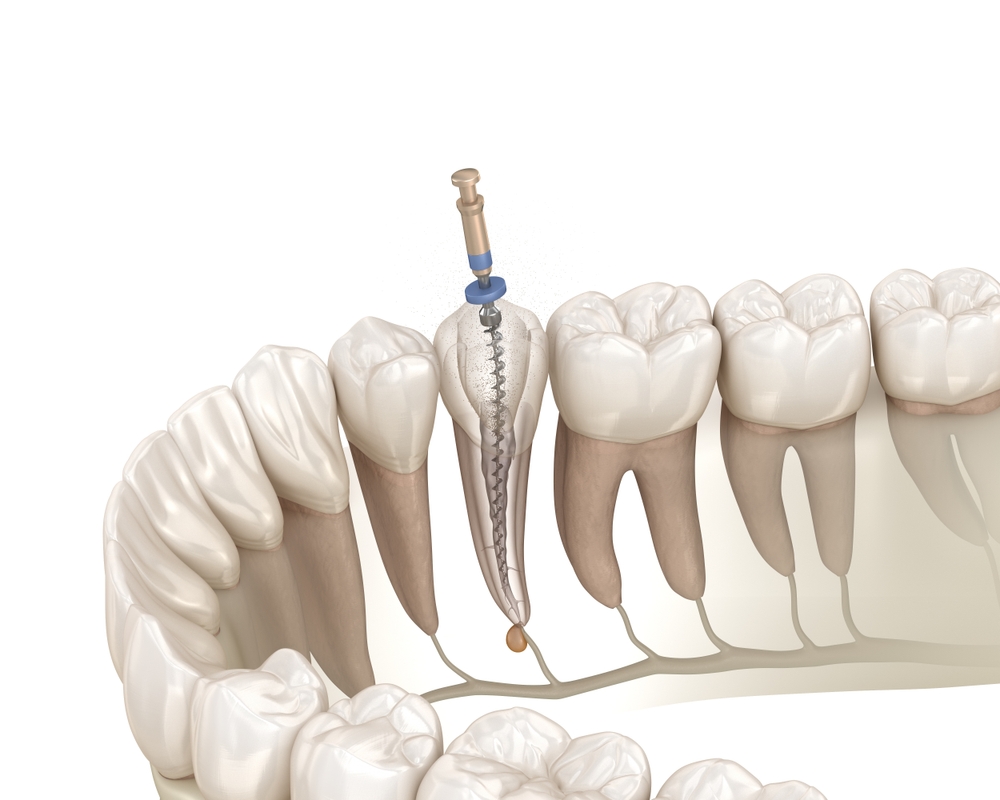Root Canals
Root canals are critically important in dentistry as they can save a tooth that has become infected or severely decayed. During a root canal procedure, the infected or damaged pulp inside the tooth is removed, and the interior is cleaned, disinfected, and sealed. This process prevents the spread of infection, alleviates pain, and allows the tooth to remain functional.
Root canals help preserve natural teeth, maintain oral health, and prevent the need for extraction, thereby contributing to overall dental well-being and quality of life.

Signs You Might Need a Root Canal
Persistent or Severe Tooth Pain
This is often the primary symptom of infected or damaged tooth pulp. The pain may be intense and throbbing, especially when biting down or applying pressure to the tooth. It can linger even after the stimulus (such as cold or hot foods) is removed. The pain may sometimes radiate to the jaw, ear, or temple area.
Sensitivity to Temperature Changes
If you experience sharp pain or sensitivity when consuming hot or cold foods and beverages, this could indicate that the nerve inside the tooth is affected. Unlike normal sensitivity, which subsides quickly, this sensitivity can persist and may indicate the need for a root canal.
Gum Tenderness and Swelling
Inflammation and infection in the tooth pulp can cause tenderness, redness, and swelling of the gums surrounding the affected tooth. The area may feel tender to the touch, and you might notice localized swelling or a small, pimple-like bump (abscess) on the gum near the tooth.
Discoloration of the Tooth
A tooth that has changed color, typically becoming darker or grayish compared to neighboring teeth, may indicate that the pulp inside the tooth is dead or dying. This discoloration occurs due to the breakdown of internal tissues and blood vessels.
Prolonged Sensitivity to Touch or Pressure
If touching or applying pressure to the tooth causes lingering pain or discomfort, this suggests that the nerve and surrounding tissues are inflamed or infected. This sensitivity may also be present when chewing or biting down.
Bad Taste or Persistent Bad Breath
An infected tooth can release pus and bacteria, resulting in an unpleasant taste in the mouth or persistent bad breath that does not improve with oral hygiene practices. This occurs when the infection spreads to the surrounding tissues or bone.
Loosening of the Tooth
In advanced cases of tooth infection or damage, the supporting bone structure around the tooth may weaken, causing the tooth to feel loose or unstable. This is a sign of severe infection and may indicate that the tooth is at risk of being lost if not treated promptly.
Facial Swelling
In some cases, particularly when an abscess forms, you may experience swelling in the face or cheek on the side of the affected tooth. This swelling may be accompanied by pain, redness, and warmth in the affected area.
The Root Canal Procedure
Initial Examination and X-Rays
The process begins with a thorough examination performed by our dentist, who will assess the tooth and take X-rays to determine the extent of the infection and identify the number and shape of the root canals.
Anesthesia
Local anesthesia is administered to numb the area surrounding the affected tooth, ensuring you remain comfortable throughout the procedure. Contrary to popular belief, modern techniques and anesthesia make root canals relatively painless.
Access to the Pulp Chamber
To access the infected pulp and root canals, our dentist will create a small opening in the tooth's crown. This allows them to remove the infected or damaged pulp tissue efficiently.
Cleaning and Shaping the Root Canals
Using specialized instruments called files, our dentist will carefully clean the inside of the tooth, removing debris, bacteria, and any remaining pulp. The root canals are then shaped to prepare them for filling.
Medication
Medication may sometimes be placed inside the tooth to eliminate any remaining bacteria and reduce the risk of further infection. Our dentist will determine if this step is necessary based on the severity of the infection.
Filling the Root Canals
Once cleaned and shaped, the root canals are filled with gutta-percha, a biocompatible material that seals the canals to prevent recontamination and provides structural support to the tooth.
Sealing the Tooth
After filling the root canals, a temporary or permanent filling is placed in the opening created at the beginning of the procedure. This seals the tooth and protects it from further infection.
Restoration of the Tooth
In most cases, a tooth that has undergone a root canal will require a crown to strengthen and protect it. The crown is custom-made to match the shape and color of your natural teeth, restoring functionality and aesthetics.
The Benefits of Root Canals
- Eliminate severe tooth pain caused by infection or inflammation of the tooth pulp.
- Allow you to keep your natural tooth rather than opting for extraction.
- Remove infected tissue and seals the tooth to prevent further infection.
- Enable you to chew and bite comfortably without pain.
- Maintain the appearance of your natural smile with a crown that matches the surrounding teeth.
- Stop infection from spreading to the jawbone and preserve bone structure.
- Often more affordable than tooth extraction, followed by replacement options like implants.
- With proper care, a root canal-treated tooth can last a lifetime.
The root canal procedure is a valuable treatment that saves teeth from extraction, relieves pain, and restores oral health. If you're experiencing symptoms of a tooth infection or damage, Visit Parkway Dental at 1404 Sun River Pkwy #125, St. George, UT 84790, or call (435) 256-6167 to discover how root canal treatment can alleviate pain, save your natural tooth, and restore your smile's health and function.

Working Hours
- MON - THU8:00 am - 4:00 pm
- FRIBy appointments only
- SAT - SUNClosed